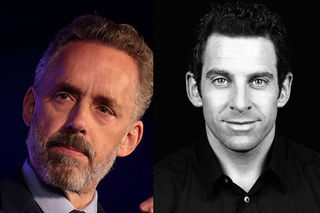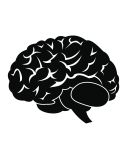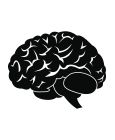Religion
The Intellectual Dark Web Debates Religion
Jordan Peterson and Sam Harris squared off in three recent discussions.
Posted July 30, 2018
By Alexander Blum
Canadian psychologist Jordan Peterson and American neuroscientist Sam Harris recently met to hash out one of the longest-running debates known to homo sapiens: whether religious claims are based in reality.
The “New Atheists” argued about this throughout the 2000s, often facing off against traditional Christian philosophers and theologians. But now that Richard Dawkins, Daniel Dennett and the late Christopher Hitchens no longer conduct group discussions, Harris is left in peculiar circumstances: His new assortment of allies in the Intellectual Dark Web, a curiously named group of public thinkers generally concerned about political tribalism and free speech, tend to be non-confrontational when it comes to the question of religion.
Jordan Peterson, for his part, believes that the notion of logos, or true speech, formulated in ancient Egyptian myths and Greek treatises, then refined through Christianity, is at the core of Enlightenment traditions such as freedom of speech and the dignity of the individual.
Harris disagrees. Whether or not human beings have found religious ideas historically useful, he argues, the fruits of rationality and science have taken the place of religion in a modern person’s search for truth.
What makes the debate so mercurial is that Peterson himself does not believe in traditional Christian claims such as the resurrection. Rather, he sees religious belief as a Darwinian adaptation that remains mostly unconscious. He has approached the topic as a psychologist, first and foremost, asserting that whether there actually is a God, or a spiritual reality underlying our religious stories, is too difficult a question for us to answer. Instead, we must assess the truth value of religion according to its foundations in the human psyche and societal organization.

Across three discussions moderated by evolutionary biologist Bret Weinstein—spanning late June to mid July, two held in Vancouver and one in Dublin with political writer Douglas Murray—Harris and Peterson debated the roots of religion and what it means to us today.
One illuminating way of thinking about religious belief, evoked in their second debate, involves a loaded gun. If we are taught to treat all guns as loaded, the argument goes, we will be safer in the long run. Whether or not it is true that a particular gun is loaded or not does not matter—so long as we treat every gun as if it is loaded, we will be more likely to survive. A society that believes that every gun is loaded, then, is more likely to survive than a society which does not. As Harris described it, “There’s a literal truth, and a metaphorical truth, otherwise known as a very useful fiction, which in this case is actually more useful than the literal truth.”
Transfer this thought experiment into religion: A society that believes every human being is crafted in the image of God could be more likely to survive than one which believes human beings have no fundamental purpose. Peterson defended the usefulness of Biblical stories in terms of Darwinian natural selection. “The origin of these profound stories is that people first began to behave in ways that had survival significance," he said. "Because we can observe ourselves, we started to make representations or dramatizations of these patterns, and encapsulated them in stories.”
In his lectures and writings, Peterson describes the story of Cain and Abel as a warning against envy and resentment, and the Tower of Babel as a call for caution against centralized, totalizing systems. These stories, he argues, are “metaphorically true,” even if they are literally false.
Though Harris conceded that religious stories contain some useful ethical information, however, he argued that they include utterly useless information as well, and are “based on implicit belief in the presence of deities. It’s a misapprehension of the causal structure of the cosmos.” In other words, religion may be a useful fiction, but it still amounts to fiction.
For Peterson, there is value in what our ancestors believed, and despite the success of secular ethics, we are at risk of losing these ethical systems if we do not fully understand their origins.
He used ancient ideas about human and animal sacrifice to illustrate this point—disavowing such rituals while exploring why human beings ever maintained those ideas. “If you give up something of value now, you can gain something of value in the future," he said. "That’s the discovery of the future."
Yet even if religious stories about sacrifice were once our sloppy, primeval way of “discovering the future,” Harris countered, surely they have no such value now. “In order to make use of those stories, I don’t have to believe in revelation,” he said; secular ethics and atheism have no need for a divine cosmology.
Here, the debate reached a kind of impasse. Peterson insisted that because so much of our thinking is unconscious, and stories are our way of describing the behaviors that emerge from that unconscious processing, our old religious stories might have far more to teach us about ourselves than we can rationally discern on our own. Harris, unconvinced, called this an “evasion.” For him, the same rationality that we depend on in “every other subject” should also be applied to claims derived from religion.
Both thinkers seem to have become more articulate about these points over their three discussions, but they largely remain in their initial positions. Peterson and Harris’ first debate, after all, was over the nature of truth itself. Echoing the Darwinian arguments of philosopher Alvin Plantinga, Peterson said that truth and rationality, as adaptive faculties, should be judged entirely on whether or not the creature who possesses them is better able to survive. Harris considered this an utter stretch, contending that even if human beings go extinct in a century, our rational propositions and scientific discoveries would remain just as true as they would be if we survive. Peterson holds that if we destroy ourselves, then our “truths” weren’t true at all.
At the end of the debates, the fundamental question of religion and the human mind remains unsettled. But that doesn’t take the joy out of watching two scientists tear out the foundations of truth, morality and culture beneath their feet and try to put them back together again.
Alexander Blum is a writer in New York and a former Psychology Today editorial intern.




